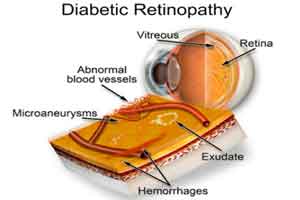- Home
- Editorial
- News
- Practice Guidelines
- Anesthesiology Guidelines
- Cancer Guidelines
- Cardiac Sciences Guidelines
- Critical Care Guidelines
- Dentistry Guidelines
- Dermatology Guidelines
- Diabetes and Endo Guidelines
- Diagnostics Guidelines
- ENT Guidelines
- Featured Practice Guidelines
- Gastroenterology Guidelines
- Geriatrics Guidelines
- Medicine Guidelines
- Nephrology Guidelines
- Neurosciences Guidelines
- Obs and Gynae Guidelines
- Ophthalmology Guidelines
- Orthopaedics Guidelines
- Paediatrics Guidelines
- Psychiatry Guidelines
- Pulmonology Guidelines
- Radiology Guidelines
- Surgery Guidelines
- Urology Guidelines
Soon, drugs to halt accelerated onset of diabetic retinopathy

Washington D.C : A team of researchers has identified a candidate biomarker of accelerated onset diabetic retinopathy, bringing new therapies closer to reality.
The researchers from Massachusetts Eye and Ear and Schepens Eye Research Institute have shown an association between a defective myogenic response, the regulatory increase or decrease in blood pressure to keep blood flow within the vessels of the retina constant, and early, accelerated development of retinopathy in patients with type 1 diabetes.
These findings identify one mechanism to explain why some patients develop diabetic retinopathy sooner than others. Furthermore, the findings provide a target for future study, which may lead to therapies to delay or prevent the development of accelerated onset diabetic retinopathy.
Senior scientist Mara Lorenzi said that in patients with a normal myogenic response, the retinal vessels constrict when increased pressure arrives, to maintain constant blood flow and avoid damage to the smaller vessels in the retina.
Lorenzi added, "But we saw that, in about half of the diabetic patients in our study, the vessels did not constrict. In fact, paradoxically, some patients' vessels dilated, and the blood flow to the retina was increased. This becomes a mechanism of damage for the small vessels, because these tiny, delicate capillaries are exposed to a big flow of pressure that can lead to the little hemorrhages and fluid leakage that are characteristic of diabetic retinopathy."
The study included a small prospective study, in which the researchers closely followed 17 patients with type 1 diabetes whose myogenic responses had been measured four years prior.
Lorenzi noted that now, they have a target to be investigated for the development of drugs or interventions to halt or stall the onset of clinical retinopathy.
The study is published online in Investigative Ophthalmology and Visual Science.

Disclaimer: This site is primarily intended for healthcare professionals. Any content/information on this website does not replace the advice of medical and/or health professionals and should not be construed as medical/diagnostic advice/endorsement or prescription. Use of this site is subject to our terms of use, privacy policy, advertisement policy. © 2020 Minerva Medical Treatment Pvt Ltd